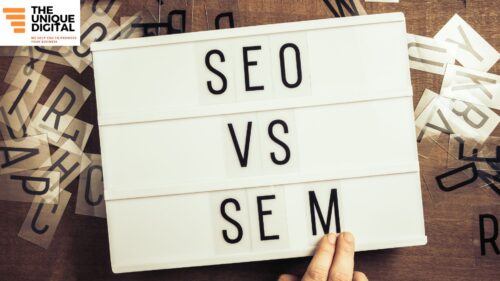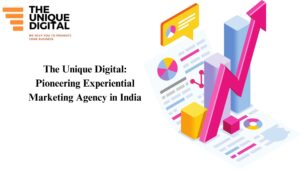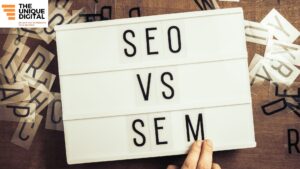Table of Contents

Difference Between SEO and SMM
In today’s digital landscape, businesses must maintain a robust online presence to remain competitive. The primary tools for achieving this are Search Engine Optimization (SEO) and Social Media Marketing (SMM). While both are critical to digital marketing, they function differently and serve distinct purposes. In this blog, we will explore the difference between SEO and SMM, focusing on their definitions, goals, strategies, and benefits to help you understand how they contribute to an effective digital marketing strategy.
What is SEO?
Search Engine Optimization (SEO) is the process of optimizing a website or online content to improve its visibility in search engines like Google, Bing, and Yahoo. The main goal of SEO is to increase the organic traffic to a website by making it more appealing to search engines through keyword optimization, backlink building, and improving site speed and structure.
SEO is a long-term strategy that focuses on providing value to users by delivering relevant and useful content, ensuring that your site ranks higher in search engine results pages (SERPs).
What is SMM?
Social Media Marketing (SMM) refers to the use of social media platforms such as Facebook, Instagram, Twitter, LinkedIn, and Pinterest to promote a product, service, or brand. Unlike SEO, SMM is more immediate and focuses on engaging with users in real-time by sharing content, interacting with followers, and running paid advertising campaigns.
SMM helps in building brand awareness, engaging with customers, and driving traffic to your website through platforms where your audience spends most of their time.
Goals of SEO vs. SMM
The goals of SEO and SMM differ significantly due to their distinct nature:
SEO Goals:
- Increase organic website traffic
- Improve search engine rankings
- Enhance user experience on the website
- Build credibility and trust through content
SMM Goals:
- Build brand awareness and loyalty
- Engage and interact with the target audience
- Drive traffic to a website through social channels
- Encourage social sharing and user-generated content
How SEO Works: Key Strategies
SEO revolves around optimizing various aspects of your website and online content. The primary strategies include:
Keyword Research and Optimization: Identifying relevant keywords and integrating them into your content to align with user searches.
On-Page SEO: Ensuring your website’s content, titles, meta descriptions, and internal linking structure are optimized for search engines.
Off-Page SEO (Link Building): Building backlinks from high-authority sites to increase your website’s credibility and rankings.
Technical SEO: Improving your website’s loading speed, mobile-friendliness, and ensuring it’s properly indexed by search engines.
Content Marketing: Creating valuable, informative, and engaging content that attracts users and encourages them to stay longer on your site.
How SMM Works: Key Strategies
SMM involves leveraging social media platforms to connect with your audience. The key strategies include:
Content Creation: Developing engaging and shareable content (images, videos, blogs) tailored to each platform’s audience.
Community Engagement: Interacting with followers through comments, messages, and posts to build relationships and trust.
Social Media Advertising: Running targeted ads to reach specific demographics based on location, interests, behavior, and more.
Influencer Marketing: Collaborating with influencers who have a large following in your niche to promote your brand and products.
Analytics and Reporting: Monitoring engagement metrics (likes, shares, comments) and website traffic from social media platforms to assess performance and adjust strategies.
SEO vs. SMM: A Comparative Analysis
| Factor | SEO | SMM |
|---|---|---|
| Time to See Results | Long-term strategy; takes months | Short-term; results can be immediate |
| Cost | Generally lower, but requires consistent effort | Can be expensive due to ad costs |
| Platform | Search engines like Google, Bing | Social media platforms like Facebook, Instagram |
| Content Type | Blogs, articles, website content | Posts, images, videos, live streams |
| Engagement | Lower engagement; passive interaction | High engagement; active interaction |
| Longevity | Evergreen content remains relevant | Content has a shorter lifespan |
| Reach | Global reach, dependent on search terms | Highly targeted based on user demographics |
Benefits of SEO
Increased Organic Traffic:
SEO helps your website rank higher in search engine results, which leads to increased visibility and more organic traffic. Unlike paid advertising, organic traffic is free, making it one of the most cost-effective ways to drive potential customers to your site.
2. Long-Term Results:
Unlike paid marketing strategies that stop yielding results once you stop investing, the benefits of SEO can last for a long time. Once your website is properly optimized and ranks high on search engines, you can enjoy sustained traffic for months or even years with minimal ongoing investment.
3. Credibility and Trust:
Websites that appear at the top of search results are often perceived as more credible and trustworthy by users. By optimizing your website with valuable content, good user experience, and proper SEO techniques, you can build trust with your audience.
4. Better User Experience (UX):
A key component of SEO is improving the usability and structure of your website. Factors like mobile-friendliness, page speed, and easy navigation contribute to a better user experience, which not only helps with SEO rankings but also enhances customer satisfaction.
5. Higher Return on Investment (ROI):
Compared to other marketing tactics like paid search or social media ads, SEO delivers a higher return on investment. By attracting users who are actively searching for information related to your business, SEO helps convert traffic into customers more efficiently.
6. Cost-Effectiveness:
Once you’ve optimized your site, there’s little to no cost involved in maintaining your SEO rankings, especially compared to continuous ad spending for paid campaigns. This makes SEO a cost-effective option for long-term growth.
7. Competitive Advantage:
If your competitors are investing in SEO and you’re not, you’re missing out on a significant portion of the market. By staying ahead in SEO, you can outperform competitors who may not be optimizing their websites, leading to higher traffic and more customers.
8. Targeted Traffic:
SEO allows you to reach users who are specifically looking for what your business offers. By optimizing for relevant keywords, you attract targeted traffic that is more likely to convert, providing better quality leads than general traffic.
9. Better Local Visibility:
Local SEO helps businesses optimize for location-specific searches. For businesses that operate in specific regions or cities, this can result in higher visibility for local customers, driving more foot traffic or local inquiries.
10. Measurable Results:
SEO results are measurable, allowing you to track and analyze the performance of your SEO strategy through tools like Google Analytics. You can monitor important metrics such as traffic, keyword rankings, conversion rates, and bounce rates to refine and improve your approach.
11. Brand Awareness:
Ranking high in search engine results increases the visibility of your brand, helping users recognize your business when they search for related products or services. Over time, this can lead to increased brand awareness and loyalty.
12. Sustainability:
SEO provides a sustainable marketing strategy. The effort you put into optimizing your site can continue to pay off without continuous expenditure, unlike PPC (pay-per-click) campaigns that require ongoing funding.
13. Integration with Other Marketing Channels:
SEO complements other digital marketing strategies like content marketing, social media marketing, and paid advertising. For instance, your SEO-optimized content can be shared on social media for broader reach, while your paid ads can bring immediate traffic to an SEO-friendly site, improving conversion rates.
By investing in SEO, businesses can ensure long-term growth, cost-effective customer acquisition, and improved online visibility, making it a crucial element of any digital marketing strategy.
Benefits of Social Media Marketing (SMM)
1. Increased Brand Awareness:
Social Media Marketing (SMM) helps businesses increase brand visibility by leveraging popular social platforms like Facebook, Instagram, Twitter, LinkedIn, and Pinterest. With billions of active users, social media allows brands to reach large, diverse audiences and create awareness in a highly effective way. Regular posting, engaging content, and social media ads ensure that your brand gets in front of more people.
2. Direct Engagement with Customers:
SMM allows businesses to directly engage with their target audience, creating a two-way communication channel. You can respond to customer queries, gather feedback, and create conversations around your brand, which builds stronger relationships and customer loyalty.
3. Cost-Effective Marketing Strategy:
Compared to traditional marketing, social media marketing is highly cost-effective. Most social platforms allow businesses to create free accounts, and even paid advertising on platforms like Facebook and Instagram is more affordable than traditional methods such as TV ads or billboards. This makes SMM accessible to businesses of all sizes, including small businesses and startups.
4. Improved Customer Insights:
Social media platforms provide valuable insights into audience behavior, preferences, and demographics. Tools like Facebook Insights, Instagram Analytics, and Twitter Analytics allow businesses to monitor engagement, track campaign performance, and refine their strategies based on customer interests and behaviors. This data helps in making more informed marketing decisions.
5. Faster Results and Immediate Traffic:
While SEO is a long-term strategy, SMM delivers faster results, especially with paid advertising. With a well-targeted ad campaign, you can immediately direct traffic to your website, landing pages, or product offers, helping generate leads and conversions within a short time frame.
6. Enhanced Brand Loyalty:
Social media fosters community-building and personal connections with followers. When businesses interact with their audience, provide helpful content, and engage with their followers in a meaningful way, it cultivates brand loyalty. Followers who feel connected to a brand are more likely to remain loyal customers and advocates.
7. Higher Conversion Rates:
Social media engagement often leads to higher conversion rates. The personal interaction and customer trust that SMM fosters help humanize your brand, which can influence customers’ purchasing decisions. Additionally, targeted ads on social media can drive potential customers directly to your website or product pages, increasing the likelihood of conversions.
8. Increased Website Traffic:
By promoting content, offers, and announcements on social media, businesses can drive significant traffic to their websites. Whether you’re sharing blog posts, product promotions, or company news, social media acts as a gateway to funnel users from social platforms to your business site, where they can learn more about your offerings.
9. Audience Targeting and Precision:
SMM allows for highly targeted advertising. Platforms like Facebook and Instagram enable businesses to run ads aimed at specific demographics, including age, gender, interests, location, and behavior. This ensures that your marketing efforts are reaching the right people, maximizing your advertising spend’s effectiveness.
10. Brand Authority and Credibility:
Consistent, informative, and engaging content on social media helps position your brand as an industry leader. By sharing valuable information, answering customer queries, and participating in relevant discussions, your brand can build authority and credibility over time, making customers trust you more.
11. Social Proof and User-Generated Content:
Social media acts as a platform for social proof, where satisfied customers share their experiences through reviews, testimonials, and user-generated content (UGC). Encouraging your customers to tag your brand in their posts or share photos of them using your product increases your brand’s credibility and influences the buying decisions of potential customers.
12. Increased Customer Satisfaction:
When customers can engage directly with brands via social media, they appreciate the convenience and real-time responses. Quick, personalized replies to customer inquiries or concerns create a positive brand experience, boosting overall customer satisfaction.
13. Competitive Advantage:
A strong social media presence can give you an edge over competitors who aren’t as active or engaging on these platforms. By staying ahead with innovative campaigns, trends, and timely responses, you can stand out in your niche and capture more market share.
14. Influencer Partnerships:
SMM opens the door to influencer marketing, where brands collaborate with popular figures or industry experts to promote their products. Partnering with influencers who align with your brand can help you reach new audiences, boost credibility, and increase conversions.
15. Retargeting Potential Customers:
Social media platforms like Facebook offer retargeting options, allowing businesses to display ads to users who have previously visited their website or engaged with their content. This helps businesses recapture the interest of potential customers who may not have converted on their first visit, increasing the chances of them completing a purchase.
16. Viral Marketing Opportunities:
The shareable nature of social media content gives businesses the chance to go viral. When users engage with and share your content with their own networks, your brand reaches a much wider audience without any additional advertising costs, amplifying your marketing efforts organically.
17. Building a Community:
Social media allows businesses to create dedicated communities around their brands. By fostering discussions, encouraging user interaction, and hosting events such as Q&A sessions or live streams, businesses can build a loyal following and develop a deeper relationship with their audience.
18. Real-Time Market Updates:
Through social media, businesses can stay updated on industry trends, market developments, and competitor activities in real-time. You can quickly adapt to new changes, take advantage of trending topics, and stay relevant in a constantly evolving digital environment.
By utilizing the advantages of SMM, businesses can build meaningful relationships with their audience, improve brand visibility, and achieve immediate marketing results, making it an essential component of modern digital marketing strategies.
When to Use SEO or SMM?
Use SEO when:
- You want to build a long-term organic presence.
- You aim to drive consistent and sustained traffic to your website.
- Your goal is to build credibility and trust over time.
Use SMM when:
- You want to create a buzz around a new product or service.
- Your goal is to engage directly with your audience and foster a community.
- You need immediate results from targeted campaigns.
SEO and SMM: Working Together
While SEO and SMM are different, they complement each other in a broader digital marketing strategy. Combining the strengths of both can create a well-rounded approach that drives traffic and engagement from multiple sources. For example:
- Content created for SEO can be shared on social media to increase reach.
- Social media profiles can be optimized with SEO principles to rank higher in search engines.
- Social signals (likes, shares, and comments) can indirectly affect your SEO rankings by increasing brand visibility.
Understanding the difference between SEO and SMM is crucial for creating an effective digital marketing strategy. While SEO focuses on long-term, organic growth through search engines, SMM offers immediate engagement and traffic through social media platforms. Both have unique advantages, and using them together can maximize your brand’s visibility and success online.
About The Unique Digital: Your SEO and SMM Partner
At The Unique Digital, we specialize in providing comprehensive SEO and SMM services to help businesses grow their online presence. Whether you want to rank higher in search engines or engage with your audience on social media, our team of experts is here to guide you through every step of the process. We tailor our strategies to your specific needs, ensuring that you achieve the best possible results. With our blend of SEO and SMM expertise, we can help you drive traffic, increase engagement, and grow your brand effectively.
FAQs Of SEO and SMM
SEO focuses on optimizing your website for search engines to increase organic traffic, while SMM focuses on engaging with users on social media platforms to drive traffic and build brand awareness.
SEO is generally more cost-effective in the long run as it relies on organic traffic. SMM can be more expensive due to advertising costs, but it provides quicker results.
Yes, combining SEO and SMM can enhance your overall digital marketing strategy by driving traffic from both search engines and social media platforms.
SEO is a long-term strategy, and it may take several months to see significant results, but the outcomes are sustainable and long-lasting.
The frequency depends on your audience and platform, but regular, consistent posting (several times a week) is generally recommended for maintaining engagement.






